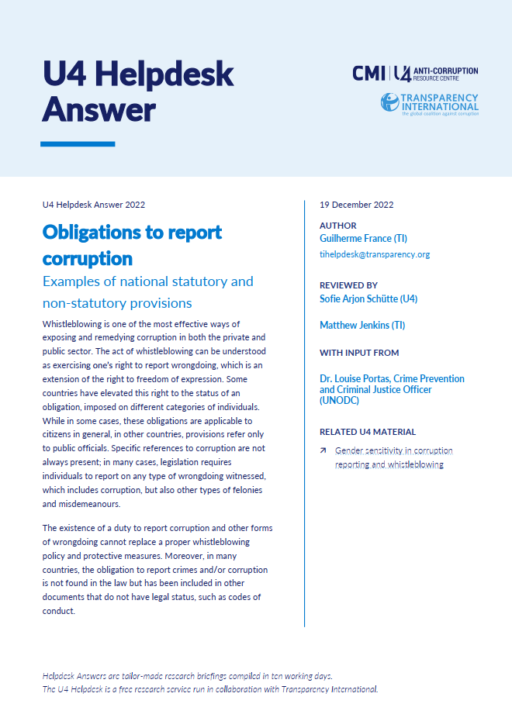- Home
- Anti-Corruption Helpdesk
- Obligations to report corruption: examples of national statutory and non-statutory provisions
Obligations to report corruption: examples of national statutory and non-statutory provisions

This Anti-Corruption Helpdesk brief was produced in response to a query from a U4 Partner Agency. The U4 Helpdesk is operated by Transparency International in collaboration with the U4 Anti-Corruption Resource Centre based at the Chr. Michelsen Institute.
Query
Please provide an overview of international and national legal instruments that establish some form of obligation for individuals and public officials to report on corruption.
Summary
Whistleblowing is one of the most effective ways of exposing and remedying corruption in both the private and public sector. The act of whistleblowing can be understood as exercising one’s right to report wrongdoing, which is an extension of the right to freedom of expression. Some countries have elevated this right to the status of an obligation, imposed on different categories of individuals. While in some cases, these obligations are applicable to citizens in general, in other countries, provisions refer only to public officials. Specific references to corruption are not always present; in many cases, legislation requires individuals to report on any type of wrongdoing witnessed, which includes corruption, but also other types of felonies and misdemeanours.
The existence of a duty to report corruption and other forms of wrongdoing cannot replace a proper whistleblowing policy and protective measures. Moreover, in many countries, the obligation to report crimes and/or corruption is not found in the law but has been included in other documents that do not have legal status, such as codes of conduct.
Contents
- Introduction
- International standards and recommendations
- National provisions
- Statutory obligations for citizens
- Statutory obligations for public officials
- Non-statutory provisions
- Policies on whistleblowing
- References
Main points
- Whistleblowing is one of the most important tools for exposing corruption.
- International standards seek to encourage individuals in general and public officials in particular to report corruption of which they have become aware, but not all of standards recommend or determine the establishment of an obligation to report.
- Dozens of countries have established statutory obligations on categories of individuals to report crimes and/or corruption they have witnessed. Provisions vary significantly, but penalties usually include imprisonment and fines.
- In some countries, this obligation is found in codes of conduct or guidelines which are not legally binding.
- There is little to no information on the actual enforcement of these provisions and no evidence that such obligations are capable, by themselves, of increasing the number of reports of corruption.
- A glaring contradiction exists in countries where individuals or public officials have an obligation to report instances of corruption, but measures to protect reporting persons are insufficient or inadequate.
Caveat
This answer focuses on obligations of natural persons to report on corruption. Due to the lack of data, it was not possible to ascertain the effectiveness of this type of provision in increasing detection of corruption.
This answer does not focus on the reporting requirements for legal persons or their employees and representatives. Nor does it touch upon the requirements or recommendations that individuals or companies involved in irregularities self-report in order to be considered for extenuating circumstances or as mitigating factors during a potential prosecution (UNODC 2013, p. 27). Rather, its focus is on individual by-standers, witnesses or, at the most, individuals who were offered bribes, for example, but did not accept them and are not directly implicated in wrongdoing.
Authors
Guilherme France (TI) [email protected]
Reviewers
Sofie Arjon Schütte (U4) and Matthew Jenkins (TI)
With input from
Dr. Louise Portas, Crime Prevention and Criminal Justice Officer (UNODC)
Date
01/02/2023
Tags
 Download PDF
Download PDF
